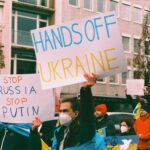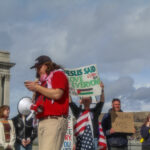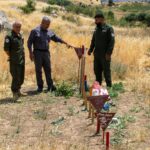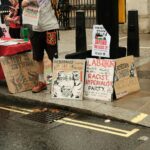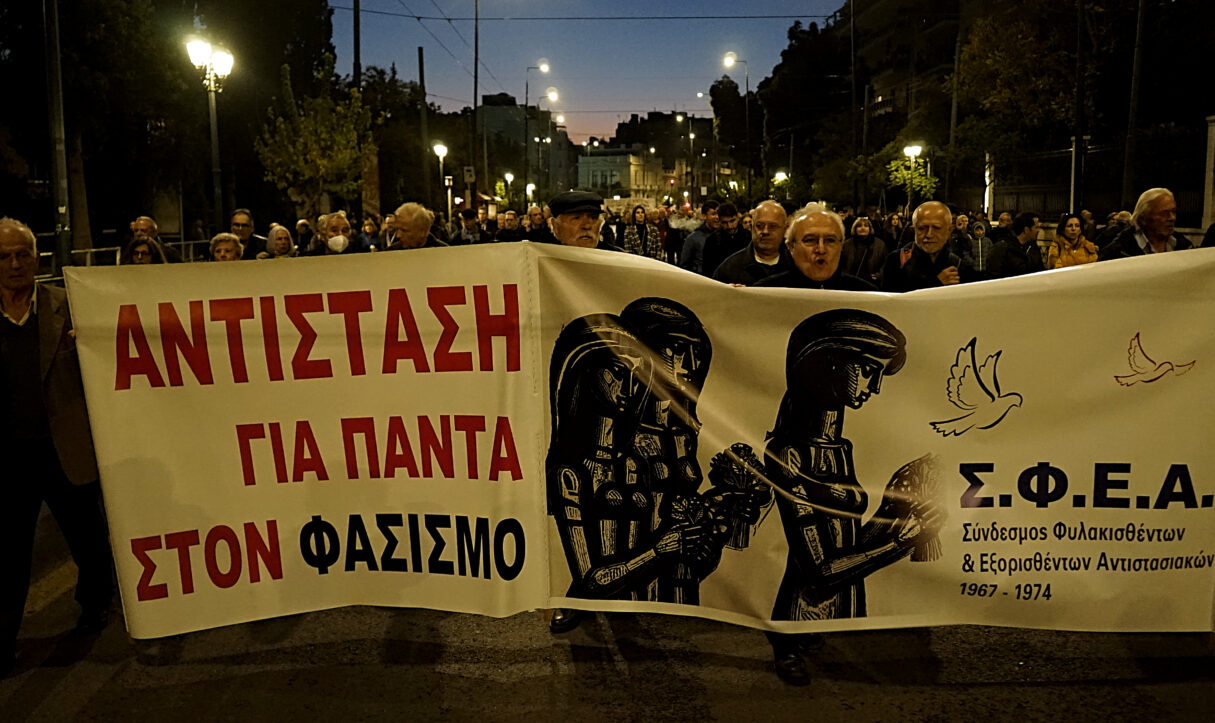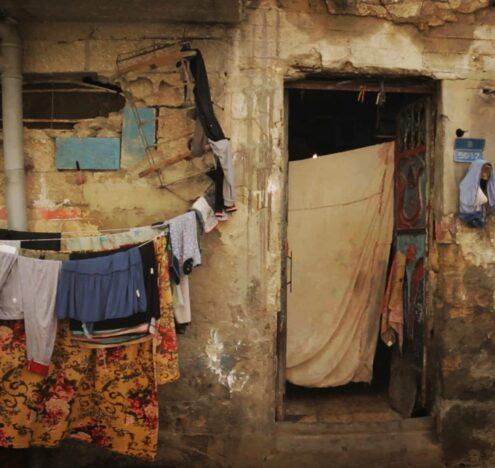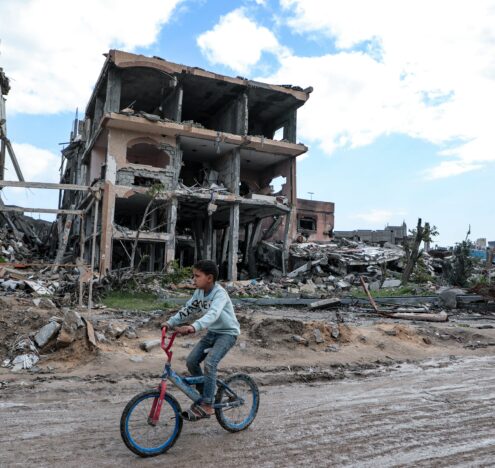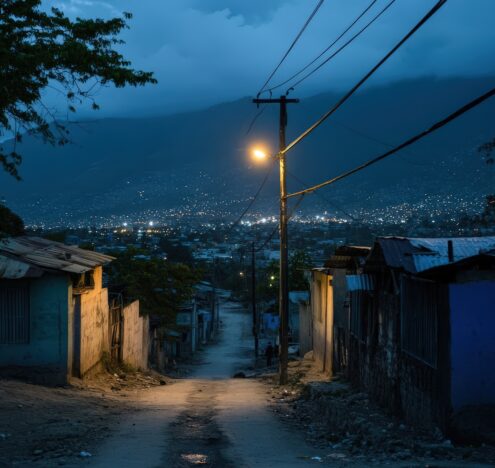As the gray afternoon faded into evening on Friday, I set out for the National Technical University of Athens, most often simply called the Polytechnic, passing through a park where I spotted threadbare graffiti that read, “Exile is hard work.” Several blocks away from the school, you could hear Greek resistance songs through loudspeakers, echoing up and down streets and alleyways.
On the sidewalk in front of the campus, left-wing student groups passed out newspapers and arranged books at booths they had lined up along the pavement. Marx and Lenin and Trotsky. Bakunin and Kropotkin. Across Patission Avenue, shopkeepers locked the doors of faded storefronts advertising discounted Italian clothing. Now and then, someone would pass through the campus’s front entrance, closed year-round save for three days in November, and approach a mangled steel gate propped on its side. They’d drop a bouquet of flowers or a wreath at the foot of the gate, and stand there in silence for a moment or two.
The commemorators were there to honor the 1973 uprising beleaguered left-wing students launched against the dictatorship. The students occupied the campus for three days, broadcasting alerts to the city through a pirate radio station they’d set up, and calling for an end to the military rule that had begun in 1967. That act of defiance ended with the junta dispatching a tank through the front gate — five decades on, the same gate remains lying on its side near the entrance — and gunning down dozens of unarmed demonstrators. Now, the entrance only opens during the three-day commemoration, when Greeks pay tribute to those students whose lives the junta cut short as they tried to shake the shackles of dictatorship.
In Athens, any given piece of graffiti doesn’t last long. Someone will spray paint on a wall — an anti-police mantra, a call for an end to imperialism — and the next day, someone else will scrawl their own tag over it. On the columns on either side of Polytechnic’s front entrance, though, the graffiti has remained untouched throughout the decade since I first visited the city. “USA out,” the left side reads, and on the right: “NATO out.”
That evening, two days before thousands would participate in the annual march on Nov. 17, students gathered in knots across the campus, smoking cigarettes and talking. Inside the campus buildings, documentaries about the fight against the dictatorship were screened. In some rooms, radicals were gearing up for the weekend’s protests.
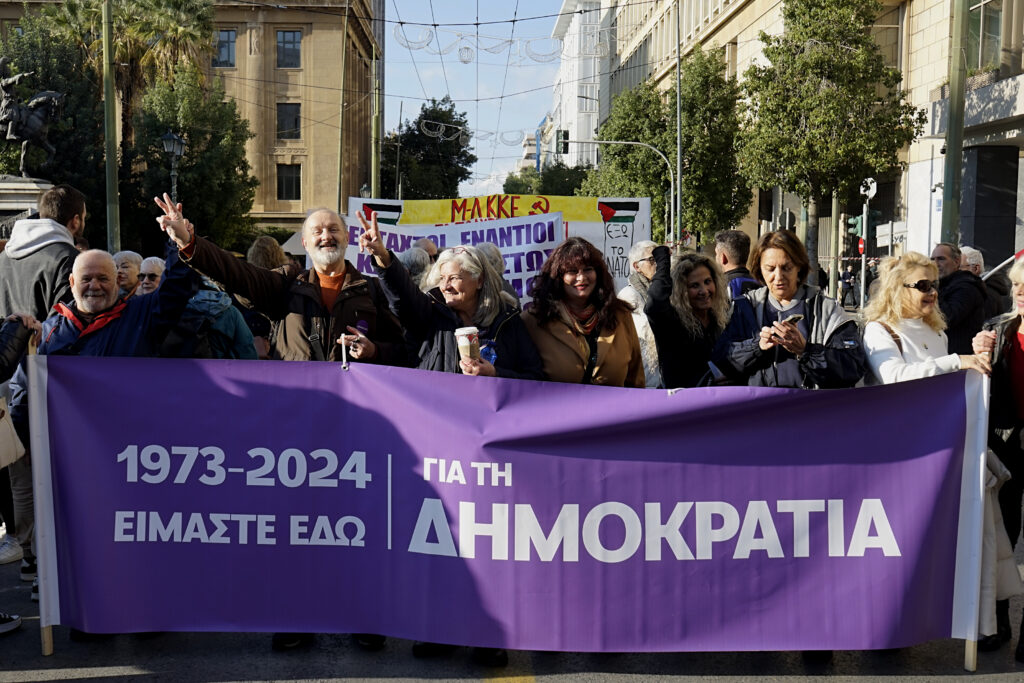
Ι found what I was looking for in a large storage hall. Lockers and tables were pushed aside and stacked atop one another to clear the area. A few dozen people were seated for an event that, at first glance, might seem like a motley group of speakers. The itinerary included a survivor of the military junta that collapsed a year after the student uprising, lawyers who led the civil prosecution of the neo-Nazi Golden Dawn party between 2015 and 2020, anti-fascist campaigners who organize rallies and strikes in the city, and an Egyptian man who survived a deadly shipwreck in the Mediterranean Sea last summer.
In Greece more than elsewhere, these causes bleed over into one another. It’s an impressive fact of the country’s left-wing political culture, one I’ve noticed since I first started covering the mass exodus of refugees and migrants crossing through the Mediterranean nearly a decade ago. At a rally against police violence, you will hear demonstrators chant for a free Palestine. If you spot activists picketing to raise awareness about femicide, you might notice a banner calling for the overthrow of capitalism. A flier passed out by campaigners on any given street corner might in the same breath condemn the government’s crackdown on anti-fascists and express solidarity with Kurdish guerillas facing down the Turkish military.
“Connect the Struggles”
With a keffiyeh tossed over her shoulders, lawyer Evgenia Kouniaki addressed the crowd at the Polytechnic on Friday. She discussed efforts to hold Greece’s coastguard accountable for the June 2023 shipwreck near Pylos that killed hundreds of refugees and migrants. She likened that effort to the fight against Golden Dawn, the neo-Nazi party that was once the third largest in the country’s parliament. After years of its members and supporters carrying out vigilante violence against refugees, migrants, and Greeks they considered political opponents, Golden Dawn was banned in October 2020 at the tail end of a five-year trial.
Kouniaki argued that these seemingly disparate fights — along with a push to get accountability for a deadly train crash in Tempi last year — require broad backing from the rest of society. “Like we did for the Golden Dawn trial, there should be from the first day labor strikes and work stoppages,” she argued. “This is what we’ve been fighting to do all along, to connect the struggles from Tempi to Pylos and from the [fight against] fascist attacks to the need for victory in Palestine.”
When his turn came, Ahmad Zisan recounted the deaths he witnessed aboard a fishing trawler, the Adriana, that sank off the Greek coast in June 2023. Among the passengers were Syrians, Egyptians, Pakistanis, and others. The boat had left Libya for Italy, but it turned up in Greek territorial waters. After it sank, Zisan was among the 104 survivors. Only 82 bodies were recovered. Worse yet for Zisan, Greek authorities accused him and eight other Egyptians of acting as smugglers. A court later acquitted the group, but the Greek government has since rejected several of the defendants’ requests for asylum.
The way Zisan put it, to witness deaths of both friends and strangers as he did on the Adriana “lessens your belief in humanity.” Now, he said, “My life now is difficult. In Egypt, we lived in a country with hunger and without freedom of expression. Now we’re living between not having papers and being far away from our families in our country.”
“Now we’re living between not having papers and being far away from our families in our country.”
As he spoke, I thought about the days after the shipwreck. I’d made the drive to the Malakasa refugee camp, around 45 minutes outside of Athens, and met a pair of Syrian teenagers who’d been aboard the boat. Both told me the Greek coastguard caused the Adriana to capsize when it lashed a tow rope to the boat. Both described people drowning around them as they fought to cling to whatever would float. Neither had a clue how they had survived.
Next up was Vangelis Giougkis, the president of the Union of Prisoners and Exiles 1967-1974, which represents those that Greece’s military junta imprisoned or sent away into what was known as “internal exile” during its reign. He said the union “stands in solidarity with the defenseless and hunted people” of the world, including the “Pylos survivors and the victims of police brutality.”
Pointing to “everything we underwent during the dictatorship,” Giougkis said: “These things cannot be forgotten, they cannot be forsaken, and they remain in our minds and in our souls. Every time there are people hunted and tortured while trying to find better lives in our country, they are people we need to help.”
“The Severed Foot that was Ours”
That an asylum seeker who survived a deadly shipwreck was speaking alongside lawyers, anti-fascists, and a survivor of Greece’s fascistic military junta on that campus, two days before the annual march to commemorate the student uprising, was more than political symbolism.
At the time I first visited Greece in 2015, when I traveled to the island of Lesbos, thousands of refugees and migrants would arrive on flimsy dinghies each day. That year, nearly a million people crossed through Greece as they tried to outrun war and economic collapse in their home countries. Volunteers from around the world had come to the island to help, and they often spoke of the crisis in humanitarian terms.
More times than not, though, Greeks spoke of shared injuries and common political struggles. Someone would mention the plight of Greek refugees ethnically cleansed from Asia Minor, who had made the same journey across the Aegean Sea nearly a century earlier. Another would speak of the Greeks exiled to the islands under the dictatorship of Ioannis Metaxas (1936-1941), throughout the country’s deadly civil war (1946-1949), or during the military junta. Many pointed to the economic crisis that still gripped Greece at the time. Suicide rates had climbed, as had unemployment, and wages plummeted. It struck me the way many Greeks would blame the same European leaders, whose policies left them hungry and jobless, for the horrors in the Mediterranean and the people drowning by the thousands as they risked the journey to the continent.
Between 1915 and 1974, one Greek regime after another used internal exile as an especially cruel form of political punishment against dissidents. Take, for instance, the quasi-fascist rule of Metaxas, when communists were shipped to the islands. Between 1946 and 1949, during the country’s civil war, the Western-backed government followed suit, imprisoning, exiling, or executing some tens of thousands of communists or suspected communists. Under the grip of the military junta that came to power via coup in 1967, internal exile resumed.
Accepted and later supported by Washington, the junta — often called the Regime of the Colonels — launched a campaign of mass arrests that sent communists, socialists, trade unionists, and other dissidents to several islands. On those islands, the internally exiled were confined to prison camps and often forced to undertake hard labor that was intentionally as pointless as it was punitive.
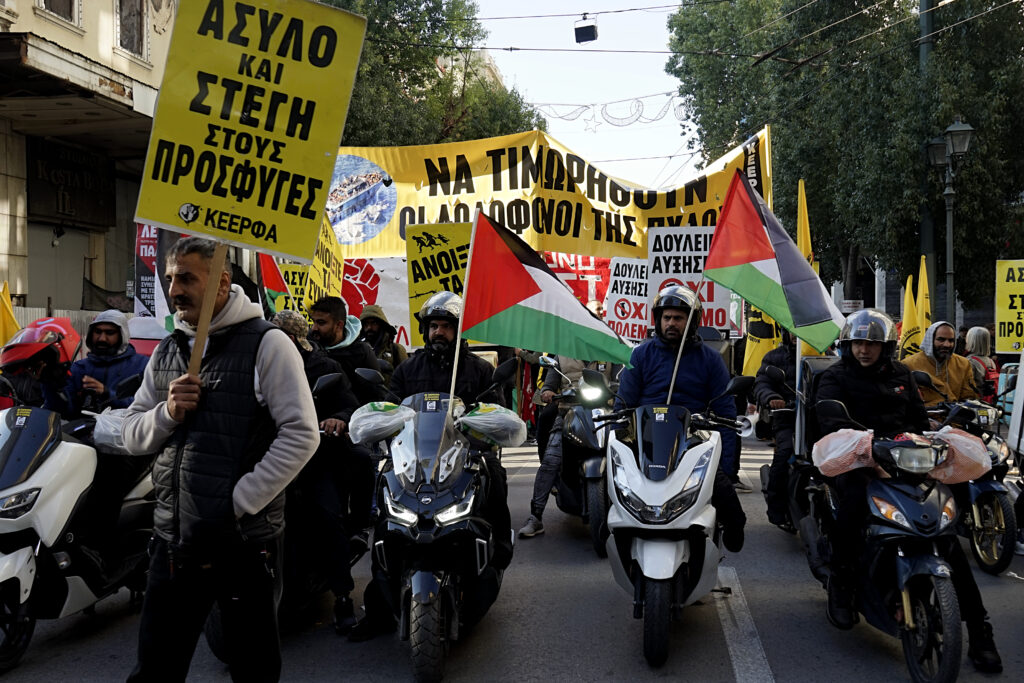
In 2024, thousands of refugees and migrants are held in what the Greek government calls “Closed Controlled Access Centers” on a handful of Aegean islands. Since the mass exodus of people from the Middle East, South Asia, and Africa began nearly a decade ago, Europe has fortified its borders and revoked the “Refugees Welcome” offer. The boats continued to set sail, though, and the Greek government eventually hatched plans for these closed facilities.
On its face, the closed camp plan was billed as an effort to control arrivals and manage the crisis. Asylum seekers would merely wait in these facilities until their applications received either a positive or negative answer. Still, from the start, rights groups warned that they could effectively serve as prisons. Today, these closed camps house people, many of them traumatized from war, who left behind their families, lives, and homes and now eat food they say is often rotten, endure water shortages, and have scarce access to either translators or adequate healthcare. In recent years, some right-wing politicians have reissued calls to warehouse refugees and migrants on uninhabited islands.
For many activists, the current calls echo the earlier times when the Greek government hauled people off to barren islands. Inexact or not, such comparisons to the past don’t require precision to be meaningful. After their ethnic cleansing from Asia Minor, Greek refugees were forced to quarantine on the uninhabited island of Makronisos. Later, during the civil war and the military junta, Makronisos operated as a military prison and concentration camp. The Greek poet Yiannis Ritsos, a communist who had joined the resistance against the Nazi occupation during World War II, was internally exiled during the civil war and again under the military junta. In 1950, while imprisoned at the Makronisos concentration camp, he wrote:
The flashlight stalks two broken arms
and you didn’t know if the severed foot
was yours
That was when we came together under the high wall
each of us alone striding over
the severed foot that was ours.
For the dwindling number of junta survivors, for many of the grandchildren and great-grandchildren of those Greeks who spent years in concentration camps and prisons on the islands, whom the military dictatorship tortured or disappeared, injuries may differ across decades and borders, but then as now, they are shared wounds.
“The Same Spirit for Us”
On Sunday, as Greeks around the country prepared to march to honor the student uprising, thousands of police officers were deployed around Athens. On street corners and at intersections, they stopped people headed to the rally, checked their bags, and detained several they suspected of planning to riot. Near the Polytechnic, a group of officers searched my bag and warned me that the march “could get ugly.”
Still, thousands of people turned up. Outside the Polytechnic, hundreds lined up to place bouquets and wreaths at the base of the gate the tank toppled 51 years ago, and the resistance poetry of Greeks like Yiannis Ritsos was recited through the loudspeakers.

Across town, as blocs of different political parties and activist groups lined up in downtown Athens, they unfurled banners and raised flags: red flags emblazoned with hammers and sickles, Palestinian flags, black-and-red flags of anarchist groups. Before the march began, I found the union of political prisoners and exiles at the front near Klathmonos Square. Nikolas Markatos, the former rector of the Polytechnic, who left the country during his university studies under the military junta, had joined the former prisoners and exiles to march. Now 80, he told me that the spirit of Polytechnic uprising mattered as much as ever. “The slogan of the uprising at that time was ‘freedom, education, and bread,’” he explained. “Throughout Europe today, there is a danger to freedom.”
He pointed to rising costs of living, unemployment among youth, and a push to legitimize “the extreme right.” Beyond him, columns of demonstrators waved Palestinian flags. “People in Greece are very upset with what is happening in Gaza and to the Palestinians. … It’s the same spirit for us, justice and freedom.”
As the sun went down, the crowd swelled to several thousand. The march took off toward Syntagma Square, an area overlooked by the Greek parliament. Riot police lined the streets on either side. It snaked along the streets, past the American embassy, and continued to the Israeli embassy several kilometers away. For much of the time, the junta survivors led the way. “Freedom to Palestine,” they chanted. Together, they held up their banner all the while: “Resist fascism forever.”
A few rows back, I spotted Pakistani migrant workers and survivors of the Pylos shipwreck marching alongside everyone else. Then as now, I thought, exile is hard work. Then as now, I thought, the severed foot belonged to everyone.


